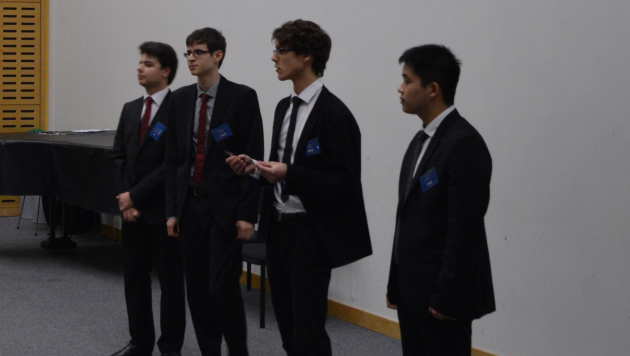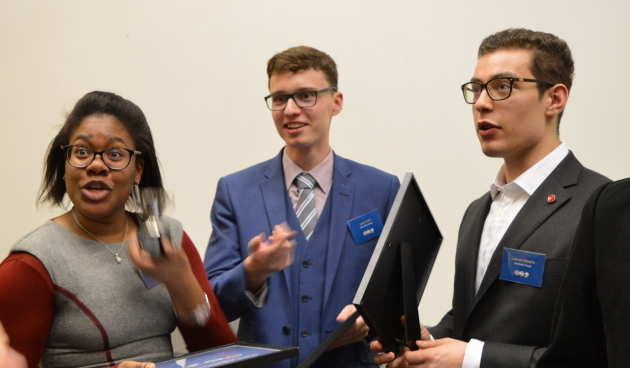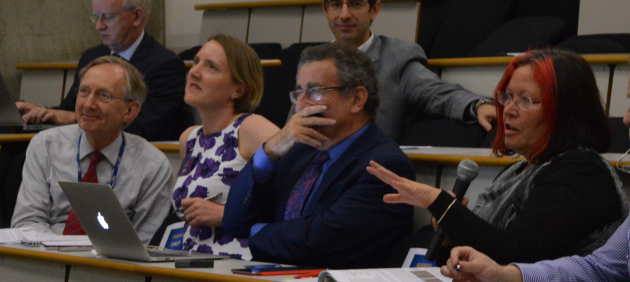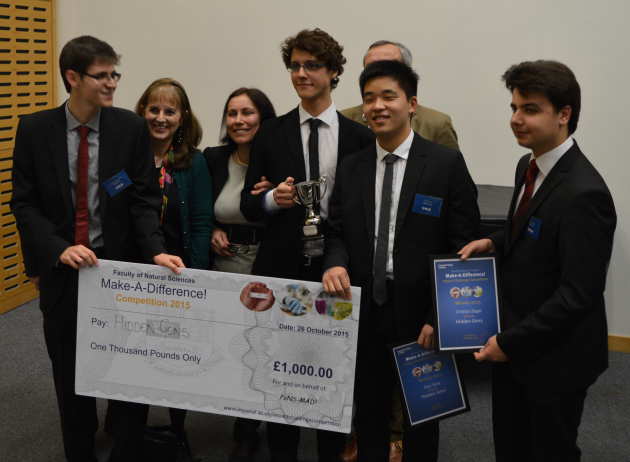The FoNS-Make-A-Difference! competition ran for the second successful year in 2015.
Over 70 undergraduate students attended the Ideas and Teambuilding Workshops, and 44 students across the departments of Chemistry, Mathematics, Life Sciences, Physics, Medicine and Engineering formed teams and applied to take part in Stage 1.
In June 2015, three teams of students were selected to go through to the final stages of the competition:
 Team CHaD are Ezra Kitson, Henry Lloyd-Laney, Adam Mills and Ivan Zheludev, all from the Department of Life Sciences.
Team CHaD are Ezra Kitson, Henry Lloyd-Laney, Adam Mills and Ivan Zheludev, all from the Department of Life Sciences.
The team worked on an idea to combat the disease schistosomiasis. They sought to develop a device that can detect the presence of Schistosoma mansoni in water, which is simple enough to be used by non-specialists.
The team have received the endorsement of a major charity, the Schistosomiasis Control Initiative (SCI), who are based at Imperial College, and spent their placement in lab space within the Natural History Museum.
 Hidden Gens are Stanislav Piletsky, Zeyu Yang and Cristian Zagar from the Department of Chemistry, and Simon Rabinowicz from the Faculty of Medicine. The team’s project aim was to synthesise molecularly imprinted polymers (MIPs) that selectively bind to specific blood antigens. This has a number of applications, but Hidden Gens’ primary objective was to engineer a new design of blood-type testing strip.
Hidden Gens are Stanislav Piletsky, Zeyu Yang and Cristian Zagar from the Department of Chemistry, and Simon Rabinowicz from the Faculty of Medicine. The team’s project aim was to synthesise molecularly imprinted polymers (MIPs) that selectively bind to specific blood antigens. This has a number of applications, but Hidden Gens’ primary objective was to engineer a new design of blood-type testing strip.
 The Velox Group are Lauren Dennis and Jakub Vaith from the Department of Chemistry and Cameron Doughty from the Department of Life Sciences. The team identified a disease without a simple qualitative technique for in-field patient diagnosis: Rift Valley Fever virus (RVF), which infects livestock with up to 90 % lethality, and has the potential to infect humans. The team worked on a qualitative in-field test for Rift Valley Fever using antibodies conjugated to nano-particles.
The Velox Group are Lauren Dennis and Jakub Vaith from the Department of Chemistry and Cameron Doughty from the Department of Life Sciences. The team identified a disease without a simple qualitative technique for in-field patient diagnosis: Rift Valley Fever virus (RVF), which infects livestock with up to 90 % lethality, and has the potential to infect humans. The team worked on a qualitative in-field test for Rift Valley Fever using antibodies conjugated to nano-particles.
 At an event on 26 October 2015, the three teams presented their projects to an invited audience and a VIP panel of judges comprising Professor Lord Robert Winston, Professor of Science and Society and Emeritus Professor of Fertility Studies, Imperial College London; Professor Sir John Pendry, Chair in Theoretical Solid State Physics, Department of Physics, Imperial College London; Professor Lesley Yellowlees, Vice-Principal and Head of the College of Science and Engineering at the University of Edinburgh; and Dr Ruth Allan, of Deloitte.
At an event on 26 October 2015, the three teams presented their projects to an invited audience and a VIP panel of judges comprising Professor Lord Robert Winston, Professor of Science and Society and Emeritus Professor of Fertility Studies, Imperial College London; Professor Sir John Pendry, Chair in Theoretical Solid State Physics, Department of Physics, Imperial College London; Professor Lesley Yellowlees, Vice-Principal and Head of the College of Science and Engineering at the University of Edinburgh; and Dr Ruth Allan, of Deloitte.
 The judges announced the winner as Hidden Gens and the team were presented with a trophy and a cheque for £1000.
The judges announced the winner as Hidden Gens and the team were presented with a trophy and a cheque for £1000.